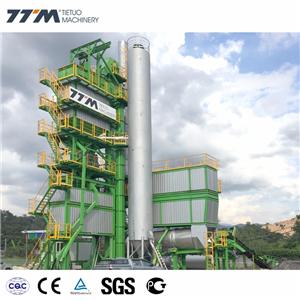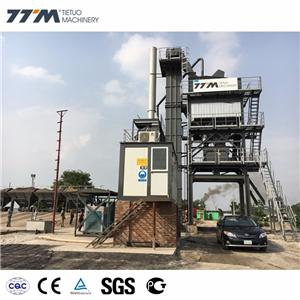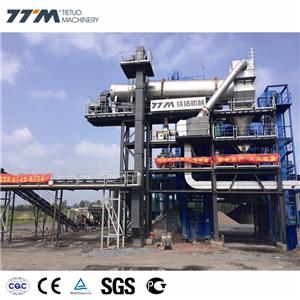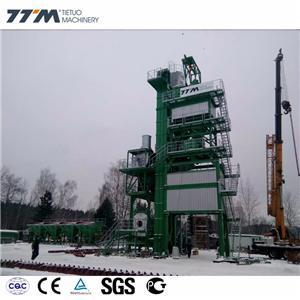Buy bitumen batching manufacturing plant mixer machine China Price
bitumen batching manufacturing plant mixer machine
Buy bitumen manufacturing plant
It is clear that several key trends are prominent in the asphalt plant sector. Manufacturers have invested a lot of time and money in developing new asphalt factory solutions to meet the needs of customers, as well as important industry needs.
First, the world needs to recycle asphalt. It is clear that simply trucking crushed cutting to landfills is an expensive and shameful waste of reusable materials. All leading asphalt factory manufacturers now offer equipment with some form of recycling capacity. The use of (RAP) on recycled asphalt pavement varies widely, and the most compact mobile factories can be configured with 15-20% RAP feed. At the same time, as long as the necessary quality requirements are met, some large and highly complex asphalt plants (continuous and batching types) can use up to 100 per cent RAP in feed.
Second, the need for easy transportation and faster commissioning has led the company to develop small factories suitable for standard containers that can be trucked to the site.These devices are usually equipped with electronic equipment, so installation may simply mean cleaning up a suitable space, loading one container on another, connecting cables, and installing material storage and transportation units.
Third, modular design to ensure that factories can be built to best meet customer requirements, different components can be based on needs. Additional containers, material storage or feed boxes, conveyor belts, and even RAP feed can be added or removed to meet specific installation needs. With this in mind, it is worth noting that the specifications of asphalt plants, whether continuous or ingredient, vary greatly from customer to customer, as buyers will choose from a long list of available options.
It is important to ensure that the quality of RAP is optimized. To this end, Amman in Switzerland and E-MAK in Turkey have introduced new technologies, but for different types of customers.
Asphalt Mixing Bitumen Equipment
bitumen mixer machine Price
Amman's solution is its RSS 120m RAP recycle machine. The device can produce up to 120 tons per hour when using ground cuttings in feed or 80 tons per hour when using rap board form. Weighing 35.5 tons, 13 meters long and 2.5 meters wide, the machine is said to be easy to transport and can be quickly put into use at the scene. The machine provides high quality major shredders, which are characterized by a reverse rotation speed of only 10 revolutions per minute. At this rate, rap pieces are broken down, but do not break stones or produce fines. In addition, the asphalt coating around each aggregate is still intact. The magnetic separator separates unstable iron or steel from the conveyor belt. Screen size can be selected according to the needs of users, the machine can produce two kinds of feed size. The ultra-fine material can be directly fed into the secondary crusher and recycled into the material, and can also be used as a secondary base material.
Plastic is found to be very useful when needed, but after use, it is simply thrown away, creating a variety of dangers. Plastic waste can be found all over the country and has begun to cause some problems. Plastic waste clogs the sewers, causing floods. It suffocates animals that eat plastic bags, etc. The plastic found in the field can prevent seeds from germinating and prevent Rain Water from absorbing them. Plastic is a kind of non-biodegradable material, which has existed as a dangerous material for hundreds of years.Plastics can only be recycled 3-4 times, and melt recycling of plastics releases highly toxic gases. In his 73rd Independence Day speech, Prime Minister Modi urged people to reduce the use of plastics, move the country away from disposable plastics and switch to jute or cotton bags, and put forward the idea of reusing waste plastics in the country.
China bitumen batching plant
The amount of plastic waste in municipal solid waste is increasing rapidly year by year. From 1950 to 2015, the global amount of waste plastics increased from 1.8 million tons in 1950 to 7.5 billion tons. According to statistics from April 2018, India produces about 5.6 million tons of coal a year, equivalent to 15342 tons a day. According to a real NGO report, Assam produced about 13505 tons of plastic waste in 2018, or 299000 kilograms of plastic a day. At the same time, Guwahati produced 37000 kilograms of plastic waste per day in the same year.
Millions of tons have been designed for the operation of large material production facilities, close to large cities. "inspired by Istanbul, there is a huge quarry that is used by a number of construction companies and is now surrounded by houses. In this case, million tons would be ideal, "said Onur reception Jill, E-Mak 's brand and marketing manager."
In addition to limiting dust, millions of tons can prevent aggregate moisture and reduce the amount of fuel used in asphalt production.




